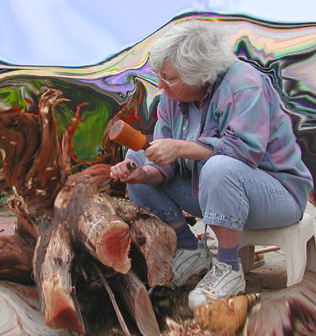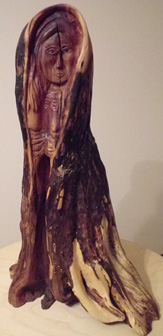| Odyssey | Spirit Caves | Mom's Bones | Tikkun Olam | Weaving | Totems |
 |
Myth and Me: Entering the Creative Commons of Spirit |
| Odyssey | Spirit Caves | Mom's Bones | Tikkun Olam | Weaving | Totems |
 |
Myth and Me: Entering the Creative Commons of Spirit |
One dark, stormy, summer afternoon, my pre-teen sons and I were visiting my parents at their island cabin off the west coast of Canada. My mother had gone out and I asked my father if he would sing to my sons the old ballads he sang when my four brothers and I were young, and if he would share with his grandsons some of his own coming-of-age stories. I pictured my sons enchanted by the refrain of "The Green-Eyed Dragon with the Thirteen Tales, Beware…." and by a story I had heard once in strange circumstances, and only the outlines of which I remembered, of when my father, ill and alone, crossing the Rockies, was suddenly encircled by a large pack of wolves. The hairs on the back of my head bristled in anticipation! Imagine my astonishment when my dear father replied, "No. You want the old songs and stories now only because you think I am dying." Like my father's stories now lost to our family, and most of my mother's stories untold too (she prided herself in being a good listener), the meaning and significance of mythic awareness is now lost to many people. Often when someone says, "That's a myth," the person means, "It's a lie." As science and religion jockey for top billing, gradually even our language is losing its memory for what myth is and what it does. Unlike some family stories that remain secrets or are withheld for various reasons, myths are often told over and over, sometimes during a special time of year, as part of a seasonal ritual, initiation, or celebration, and sometimes for thousands of years. Myth can tell a tribe's story, a people's story, a culture's story, often a sacred story. Sometimes a culture's mythic legacy is preserved and transformed in literature and other forms of art, to be appreciated for millennia. Sometimes it is venerated, as in icons, and sometimes treasured as a "sacred" text. |
 |
Penelope roughing a manzanita
Dark Goddess created by Penelope
|
 |
As Mark Schorer writes in his essay "The Necessity of Myth": "Myths are the instruments by which we continually struggle to make our experience intelligible to ourselves. A myth is a large, controlling image that gives philosophical meaning to the facts of ordinary life; that is, which has organizing value for experience…. It is the chaos of experience that creates (mythic images) and they are intended to rectify it…. A basically disorganized society such as ours is the result of a number of antithetical and competing mythologies that fail to adjust themselves." For me, as a daughter in a family with a complex and often troubled story, too sad to tell, my parents have told me, and as a girl in a family where religion was a source of deep hurt and contention, mythology opened for me an amazing treasure trove of story and wisdom. The more I read in the field, the more I wanted to read. At the same time, I longed for -- what? Why, I now sometimes wonder, and other people ask me, why did I, a serious pre-med student, so deviate from my path and end up in myth studies? Why was myth so compelling? What about it so fed my imagination and stimulated my own creativity? Myth studies, it turns out, is an amazing lab to explore human development! As I understand it, myth is like an evolving family story, but greater in scope, effect and affect, packed with thousands of years of knowledge and insight, relevant to all humans, and penetrating to the depths of human nature. Myth involves us in a "meta" structure, pointing beyond yet including the particular. As in "metaphor," which means "carrying across," myth bridges, carrying us over gaps in our understanding and experience. Myth helps us connect to the mystery beyond the bits and pieces of life. Myth also takes account of the important "metamorphoses," changes in form, function and structure, from the cosmic beginnings of all to the personal life of the one: birth, coming of age, mid-life, aging, death; from immortal to mortal, infinite to finite; through the entire range of experience: honor, anger, despair, ignorance, compassion, ruthlessness, mercy, love. As for my father, he did speak to me privately late that evening, from deep in his cups. He apologized, explaining, first, why not the song, then why not the story. Since losing his teeth, and with false teeth that were useless, he often had difficulty chewing. While he was eating lunch earlier that year, a wafer-thin slice of cucumber had slipped down his throat and stuck like a diaphragm, or plug, over the opening to his trachea, completely blocking the passage of air. He could not breathe and could not make clear to my mother at the table that he was suffocating and in need of help. Running out of breath, close to panic, and with his wry sense of humor -- after all he'd been through in his life, mortified at the indignation of dying from a sliver of cucumber -- he quickly determined what he might do. A spoon down the throat hurt terribly, but failed to dislodge the plug. He needed something with traction. With seconds before he passed out from asphyxiation, a toothbrush came to mind, and he rushed to find one, alternately forcing the bristles and the handle down his throat so that little by little he was finally able to retract the thin plug and open the airway, thus snatching his life from such an ignominious death. However, in the process, he had damaged his vocal cords irreparably, such that he lost his voice for a while and now having recovered a gravely speaking voice, was alas totally unable to sing – and too embarrassed to tell that part of the story to his grandsons. As for the story about the wolves, he explained, it was from a time in his life that filled him with such unhappiness that he did not want to return there. It was in a moment of weakness and self-pity, he said, that he had shared the story with me years ago, but in truth, in regard to that experience, once was more than enough! Most of the stories from his past he now found too sad to tell, especially to his young, impressionable grandsons. He didn't really mean what he said to me and my boys that afternoon. Rather, my question caught him off-guard and he was suddenly overcome with huge sadness at the way his life had turned out. He was sorry…. And tears slid down both of our faces. Unfortunately, that was our last visit as my father died alone of a sudden heart attack six months later. I continue to piece together the story of our family, an elusive round of Musical Chairs, the players ever circling clockwise, with never enough chairs for us all to convene at once (my lingering fantasy!) to share the family story as we each have lived it. I am grateful for the context of myth. Without a family tradition of storytelling, missing not only story-sharing parents, but also missing grandparents, uncles and aunts, I can draw on the mythic traditions of many cultures, like the ants to Psyche's rescue in the mythic tale of Amor and Psyche ("Love and the Soul"), to sort the seeds of my own becoming. We are so fortunate at this time in cultural history to be able to draw on mythic traditions from around the globe in our quest for an inclusive humanitas. What I am missing in the puzzle of my own family story I can find in the myths of the world. I am so grateful, even for the legacy of our own western foundations, to Homer's Odyssey, Hesiod's Theogony, Sophocles' Oedipus trilogy, Euripides' Oresteia, the Homeric Hymn to Demeter, the shadowy struggles of Inanna and Ereshkigal, Ovid's Metamorphoses…. where I find bits of our own family story --- set in a larger, deeper, foundational context! Myth is a thesaurus of stories that holds us all, stories we can turn to and to return to for nourishment and support. |